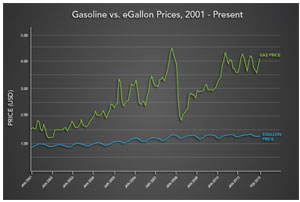Remember the days when a gallon of gas cost $1 or less?
While those days are gone for cars that run on petroleum, people that drive electric cars are enjoying the good ‘ole days. The national average for an eGallon is $1.14 – the amount of electricity that equals a gallon of gas in terms of driving range. That’s three times less than it costs to keep a gas-driving car going.
On the Department of Energy’s new eGallon website, you can quickly compare what it costs to charge an electric car vs. driving on gasoline.
"Consumers can see gasoline prices posted at the corner gas station, but are left in the dark on the cost of fueling an electric vehicle. The eGallon will bring greater transparency to vehicle operating costs, and help drivers figure out how much they might save on fuel by choosing an electric vehicle. It also shows the low and steady price of fueling with electricity," says Energy Secretary Ernest Moniz. "Not only can electric vehicles save drivers on fuel and reduce our dependence on oil, they also represent an opportunity for America to lead in a growing, global manufacturing industry."
If you check the eGallon price for your state and compare it to the price of gasoline, you’ll notice that over time, eGallon prices are far more stable and predictable than gasoline prices. That’s because eGallon prices depend on electricity rates, which are historically much more stable than gasoline prices. Gas prices vary based on the global demand for oil, which is volatile and often influenced by unpredictable international events.
The green line represents gas prices over the past decade; the blue line shows eGallon prices:

Still, all the "average" prices in the world leave out one big variable – how you personally drive a car and under what kinds of conditions.
A Carnegie Mellon University analysis shows that in urban driving conditions with lots of stops and starts, hybrids and plug-ins can cut life cycle emissions by 60% and reduce costs 20% compared to conventional vehicles, but under highway conditions, electric vehicles offer marginal emissions reductions at higher costs.
Driving a conventional vehicle in NYC, where you are constantly starting and stopping, triples lifecyle emissions and increases their costs by 30%.
Aggressive driving reduces the all-electric range of plug-in vehicles by up to 45% – accelerating hard and braking hard won’t get you the same mileage as someone who does those things gradually.
Here’s the eGallon website:
